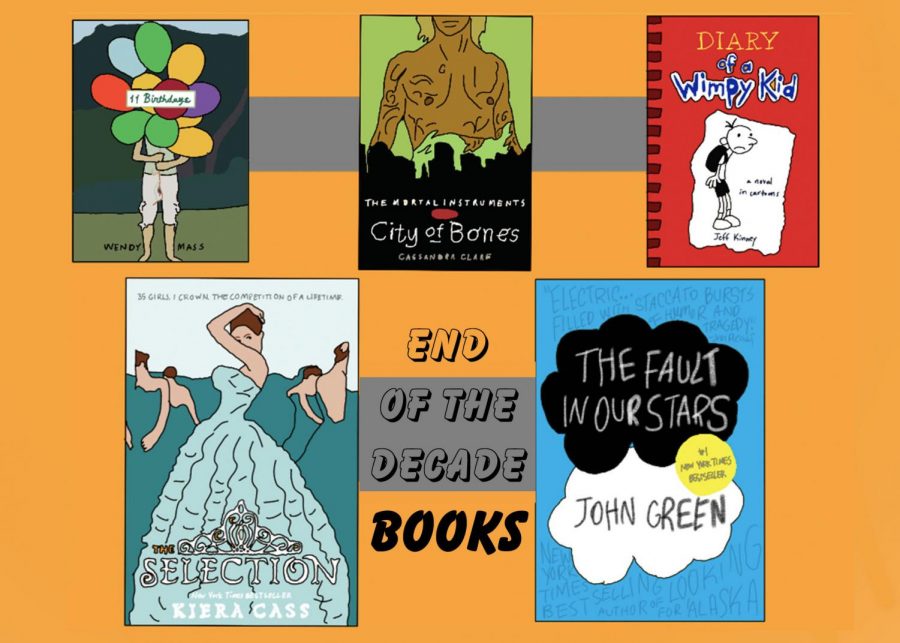Decade Wrap-Up: Literary look back at decade’s growth
Throughout the past decade, authors such as Wendy Mass, Cassandra Clare and John Green explored unique characters and storylines by showcasing everyday problems the youth faces. The Sidekick social media manager Anika Arutla discusses the impact they have had on the generation as 2020 arrives.
December 17, 2019
As a recently turned 18-year-old, the past decade is what I consider to be the growing point of my life. Throughout these years, I have learned more about myself and about the world, mostly thanks to the relatable characters, fantasy lands and underlying lessons that books provided.
Whether it be in the setting of a middle school in the small town of Willow Falls or in an alternative universe with an oppressive government, the decade of books dipped into every genre and followed us as we matured.
Towards the end of the last decade and the beginning of this decade, Wendy Mass created the Willow Falls series. Highlighting the struggles of being a tween and going through middle school, the series struck a chord with me. Even though it took place in a small town with elements that were not exactly relatable, such as magic, reading about the characters struggling with gaining and losing friendships and first crushes made going through middle school easier.
Along with the Willow Falls series, the Diary of a Wimpy Kid series presented itself during the beginning of our adolescence. Although author Jeff Kinney continues to publish books, the first few books will always hold a place in my heart. The infamous cheese touch, which translated over to my school, demonstrated the pressure of bullying.
As middle school progressed and romance became more and more prevalent, John Green and his string of heartbreaking books entered the scene. The Fault in Our Stars, released in 2012, became a phenomenon with a movie released in 2014. The quote “Okay? Okay.” became used beyond reason; I would hear it in the hallways and used it among friends for weeks. Up until this point, most books we read rarely included tragedy and showcased death in this way along with mature themes, so the story was eye-opening.
Following the trend of books that pertained to our daily lives came the era of dystopian novels. Through my observations, this specific genre reached its peak this decade due to the explosion it caused with teenagers joining growing fandoms and movie deals being announced.
The Hunger Games series, released in 2008, began the specific trend of having a plot with an oppressive government in which the characters try to overthrow. This was explored and used in the last decade with the Divergent series and the Maze Runner series. Divergent features a strong female protagonist, as opposed to a strong male protagonist, which sets it apart, much like The Hunger Games. Therefore, we grew up with inspirational female roles, falling in line with the feminist movement that errupted this decade.
Another layer to the dystopian genre includes The Selection series. Although it does not include an oppressive government, the elements of a dystopian novel remained. The factor that set these types of books apart is the fact there is romance incorporated with action and adventure, making it fulfilling to read.
In addition to dystopian novels, fantasy series were also popular, as shown through Cassandra Clare’s The Mortal Instruments series. The City of Bones, the first book in the series, released in 2007, expanded into a whole universe, which subsequently developed over the past decade. Harry Potter did this effectively, but Clare takes it to a whole new level.
The Mortal Instruments has seven books in its original series with a three-book prequel series and a three-book sequel series. Clare also has another series in the works within the same universe.
Including yet another strong female character, The Mortal Instruments series pushes the boundaries with themes of feminity and discrimination among different species. Discrimination, which will always remain a problem, shone in a different light throughout the book, with motives and the struggle becoming painstakingly clear adding to the maturity that faced us.
As the decade progressed and books became more complex, authors taught us invaluable lessons. We grew with the words they wrote and the characters they created and for that, this decade stands apart.
Follow (@AnikaArutla) and @TheSidekickCoppell on Twitter.












